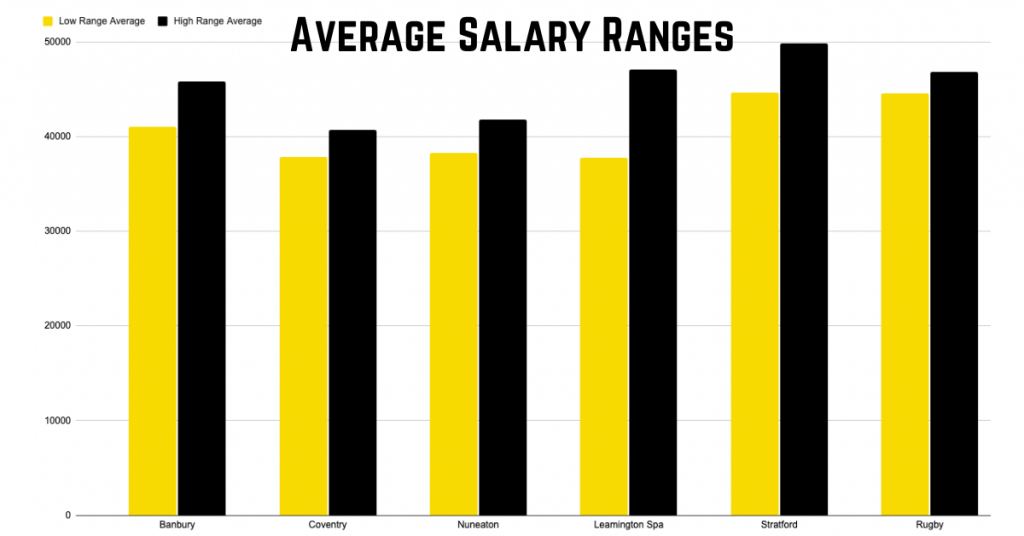Average Maintenance Engineer Salaries in Warwickshire
This article focuses on average Maintenance Engineer salaries from June to August. I’ve accumulated these statistics from a few hundred job adverts posted throughout Q3. The jobs I looked at include; starting salaries for maintenance engineers, engineering/maintenance managers salaries, and more.
It’s good to see that 93% mentioned salary and almost half displayed the salaries as a range. Even though this is good, it of course needs improvement. A job without a salary is almost not worth posting.
The salaries analysed are broken down into base salary and gross salary.
Base salary is your guaranteed annual pay which is decided on your experience, qualifications, location and other factors.
Gross salary is your base salary, plus any bonuses, benefits and other earnings on top of your guaranteed pay. This blog will give you an insight into the current industry norms for base and gross salaries across Warwickshire.
In this blog, I will cover:
Our Top Takeaways for Maintenance Engineers
Our Top Takeaways for Employers
Average Maintenance Engineer Base Salaries Per Location
How much can Maintenance Engineers earn?
Are Bonuses and Shift Allowances common?
Our top takeaways for Maintenance Engineers
In this competitive market, make sure you’re prioritising your needs whether that be earning above £40,000, or wanting a basic salary over on target earnings (OTE).
If you’re choosing a job with a higher salary, be prepared to face higher qualification needs. Lower base salary jobs gave fewer details on bonuses, in comparison to higher-paid jobs. You can see more about this in our ‘Bonuses and Shift Allowance’ section.
Why are lower-paying jobs missing out on a bonus?
Some employers are lowering annual salaries and replacing them with benefits and bonus schemes. This is done in an attempt to encourage progression and motivate engineers to work more hours. However, these results indicate the opposite, with lower salaries having none or little detail on bonuses.
Engineers are wanting more stability and guarantees with salary, especially when considering the cost of living crisis. The unknown of what the future economy will look like is a worry for engineers. If I was onboarding now, I’d rethink the salary and consider offering a bonus to accommodate the current economic climate.
Jump to our round-up of ‘Bonuses and Shift Allowance’
Lower-end salaries with no bonuses just go to show how competitive the market is currently. It’s obvious but, the more qualifications you have, the better. The more experience you have, the better. It’s the reality of the job market, you need to be realistic with your current experience and level of qualification. Pushing into higher earnings and establishing a decent annual salary is down to your level of qualification at that moment. The best thing you can do at the moment is upskill. Improving your skillset will get you closer to reaching those higher earnings and bonuses.
Jump to ‘How much can Maintenance Engineers earn?’
Our top takeaways for Employers
Include Salaries
Including salaries within job adverts are extremely important, as it’s often the deciding factor for job seekers. It can also often draw in or deter possible candidates away from a job. I discovered that 7% of job adverts failed to disclose the salary, unsurprisingly, this is pretty standard across the board. Our findings from the West Midlands show that 6% of job adverts did not disclose the salary. Publishing your salaries is necessary, whether that’s in the form of a base or range. At least it’ll give those applying an idea to realise whether it aligns with their salary needs or not.
Jump to our ‘Average Salary Per Location’ for an insight into the current salaries your competitors are offering.
Offer a Bonus
Make sure you’re offering a bonus. We found that only 15% of jobs stated bonuses in their descriptions. Doing this will set you apart in the hot job market and bring a bigger pool of candidates to you. Employers offering lower wages are doing a disservice to themselves by not going into detail on the full earning potential.
Offer a Fair Salary
Establish a fair annual salary for engineers. Offering overtime and OTE are bringing fewer candidates to you. Engineers are wanting a stable salary where they can rely on having a consistent income. Having to push overtime to bring the salary to a fair mark is not what engineers want. In the current economic crisis, engineers want guaranteed pay. Not earnings based on overtime opportunities, when realistically, the opportunities available may not be enough.
Offer a Salary Range
Offer a salary range. Offering a range, allows you to give qualified engineers a higher salary. But you’re still offering bonuses and overtime to the less qualified engineers. Give the less qualified engineers something that recognises their work and shows appreciation. It’ll go a long way. What was interesting to see, was the average salary range difference was almost £10,000 in Leamington Spa. This area has the biggest pay gap for Maintenance Engineers. The lowest average was £37,750 in Leamington Spa, and the highest was £49,833 in Stratford, demonstrating how much salaries are varying in Warwickshire.

Average Maintenance Engineer Base Salaries per Location
Similarly to our findings in the West Midlands, the salaries per area are quite varied. With the lowest for Warwickshire being Stratford, and the highest in Rugby.
Stratford = £32,439
Rugby = £42,042
The average salary being so low in Stratford is very surprising given how difficult I know that area is for strong maintenance engineers. This is also interesting, considering how high Stratford’s salaries for engineers were high when it comes to ranges, but rank the lowest in base salaries.

Interestingly, in 2017 it was reported that 18% of Warwickshire’s businesses are in Rugby. Rugby is also home to the largest employment share in the Manufacturing and Engineering sector in Warwickshire. And holds the third-largest number of employees in the borough of Warwickshire. This is interesting as the data also indicates Rugby as having the lowest proportion of jobs in high-wage sectors. With so many workers in this sector, it’s clear how it could have an impact. As many engineering workers aren’t paid a high wage.
The average salary for Nuneaton was £39,700 and in Leamington Spa was £34,946. I also gathered data on Coventry and Banbury, as I recruit in those areas too. Coventry was lower than Banbury, with an average salary of £41,183. In the Oxfordshire town of Banbury, the average salary was £46,382. This is probably down to Coventry being a city, with much more commuter links, compared to Banbury.
Do house prices affect salary?
Something else to consider – when accounting for salary ranges in different areas – is housing costs. It would cost you 6.7 times the average annual wage in Rugby to buy the average property situated there. And in Stratford, it would cost 9.2 times the average annual salary there.
This is interesting as is most likely due to the average house prices in both Rugby and Stratford. In Rugby, the average house price was £276,512 and for Stratford, it was much higher at £487,808. It would cost less for an engineer earning in Rugby to buy a house in Rugby, than in Stratford. As there are fewer high-paying sector jobs in Rugby, meaning housing prices are on average less than in Stratford. Houses need to stay relatively affordable for workers in Rugby, as it’s essential for retaining the younger generation of workers. Rugby is trying to retain a good flow of young workers. Whilst simultaneously upskilling and encouraging progression for the current employees.
Additional salary effectors
Another factor contributing towards job salaries is the commuter links. Rugby’s great transportation links mean the area can benefit from more skilled workers from afar. The average salaries could be higher as Rugby can bring in a wider candidate pool. With many local residents commuting from the surrounding areas.
Another consideration when thinking about differences in annual salaries for Maintenance Engineers is the cost of living in each city. For Rugby, the monthly utility costs were £126.25, compared to the much higher £211.11 in Stratford upon Avon. Which also strangely contradicts the findings from the salary analysis. But, we didn’t find as many job adverts in Stratford. There were 45% less of the total amount of job adverts there, so this is more likely to be the case.
It’s great to see almost half are choosing to display salaries in this way. But this does need to be higher than 47%. Displaying a salary range will appeal to more candidates and will potentially bring a range of experience. Salary variation in Warwickshire is significant.
How much can Maintenance Engineers earn?
I discovered the lowest salary being offered to Maintenance Engineers in Warwickshire to be £15,000 (for in-experienced engineers), and the highest at £55,000. There is a huge gap between these salaries, from entry-level jobs to managerial positions.
Interestingly, our salary report in the West Midlands discovered an increase in the average salary maintenance engineers are being offered. With an average 10% increase between Q2 and Q3. In a few month’s time, I’ll be conducting another salary analysis for Warwickshire. It’ll be really interesting to see if there is this much variation between quarters in Warwickshire too.
What Salary is fair for a Double Days shift?
“What salary is fair for a double days shift?”, a poll I shared that gave a great salary insight. With over 250 votes, 49% voted for only looking at £45,000+ for a double days shift pattern. I’ve seen a lot of engineers wanting higher salaries for certain shift types. It doesn’t seem fair to be offering someone working days, the same or similar pay to someone working a Panama.
This is interesting to see when only 10 out of the 292 displayed a salary of £50,000 or above. With 79%, defining the salary as needing to be above £42,000. It’s clear engineers are wanting more for this shift pattern. There are lessons to be learnt. I’ve seen this shift type paying as low as £28,000 and as high as £46,000. It’s something hiring managers can’t seem to agree on. Engineers are looking for more money – not surprising considering the cost of living crisis.
Is Salary a Benefit?
Another interesting outcome was seeing salaries being listed as a benefit, with 33 adverts listing it as a perk. The adverts listing salary as a benefit described them as ‘negotiable’, ‘salary progression’, ‘competitive’ or merged salary with OTE. This is a problem in the recruiting world. People want to see the salary for jobs being stated, not leaving it down to guessing. As this can essentially, waste both candidates’ and clients’ time.
One of the biggest things you can do is upskill. If you complete mechanical/electrical/hydraulic recognised qualifications, it’ll boost your employability. Becoming multi-skilled will open up so many more opportunities and increase your annual salary. It’ll give you more leverage to get a higher salary.
Are Bonuses and Shift Allowances common?
Gross pay expectations. As an engineer, people are wanting bonuses but they aren’t guaranteed. Either make it so your bonuses are more achievable or lower your base salaries.
We shared a poll on whether people would apply for a job if the salary wasn’t displayed. A huge 45% of the respondents answered that they wouldn’t. Someone also commented on the post that they would never apply to a job without a salary, as they had experience with a hiring manager offering below the market rate at an interview stage. This is the worry of so many Maintenance Engineers, who are wanting to apply for jobs but won’t for the fear of it being a waste of time and the salary being lower than their current earnings.
Shockingly, the number of jobs mentioning shift allowance and bonuses was really not much. Shift allowances were only offered in 9% of the 292 job adverts I analysed. And bonuses were mentioned 15% of the time. This is a great disservice for employers, as mentioning these, even if the engineer is only offered them after a probation period, will increase your candidate attraction massively.
I also discovered that out of the 15% of job ads that mentioned bonuses, 81% had a salary of at least £35,000. Salaries are typically around £35,000 for Maintenance Engineers, but with on-target earnings, they should be reaching around £45,000. Employers are lowering annual salaries and replacing them with benefits and bonus schemes, to encourage progression and motivate engineers to work more hours. You’re more likely to be offered a bonus as your salary increases.
Summary
In summary, there are a lot of takeaways for both clients and candidates. Working your way up and getting as many qualifications and as much training as you can, will benefit you in the long run, it’ll allow you to attain more bonuses and higher wages. If employers are struggling to give a pay rise to help with living costs and an increase in inflation, offering a bonus could be a great substitute. This way, it gives the employee something to work towards and can give them an extra push of motivation. Giving a bonus and motivating employees to work hard could also be seen as a stepping stone towards a pay rise.
If you’re looking at salaries for locations, consider the contributing factors to salary differences. Many areas have more expensive postcodes and could be closer to facilities, e.g. in a city. When choosing a location, consider this, and think about how far you’re willing to commute. As living within a commutable distance to somewhere that pays more but has expensive properties, will save you money and allow you to keep the difference between the higher and lower salary being offered.
Engineers are also prioritising being in a stable position, knowing their role is valued within the company and they won’t just be dismissed. Offering a suitable salary and benefits/bonus package will help employees feel appreciated and valued for their work.
Have a think about what you’ve just read and consider how does your salary compare to the average?

